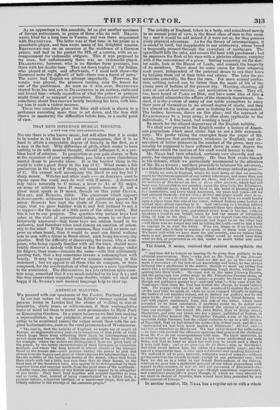THAT KEYS INFLUENCE MUSICAL THINKING.
A NUT FOR THE METAPHYSICIANS.
No one there is who knows music, but will allow that it is easier to be tender in Al) than in D ; and of consequence, that it is as hard to attain a respectable degree of ferocity in the first, as it is easy in the last. Why difference of pitch, which seems to have nothing to do with musical thought, should influence it, is a pro- blem hard of solution. In proportion as you gain sharps or flats at the signature of your composition, you take a more stimulating mental dram to provoke ideas. It is the hardest thing in the world to write a good thing in the key of C. What seems a fair production in the key of F sharp, will sound commonplace in that of C. We cannot well accompany the Devil in any key but F sharp minor. Witches and other such as JOHNSON used to rhyme upon the word, may do well with B minor. A distracted lady takes naturally to C minor, a lover to Ab or El) major, an army of soldiers have D major, priests become F, and a ghost must speak in D minor, though on this point GLUCK, MOZART, and ROSSINI, differ. The phantasm which appears in Semiramide, addresses his late but still substantial spouse in F minor. ROSSINI has kept the shade of Nintts so long on the stage, that we grow familiar with it, and feel inclined to ask it to supper—for the sake of a little news of the other world. But this is not to our purpose. The question why certain keys best usher in the visits of supernatural beings, seems to us thus sa- tisfactorily answered—that those keys are seldom heard in the orchestra, and therefore when used convey an emotion of solem- nity to the mind. If they were common, they would no more sur- prise us when heard, than it would to meet our friend walking arm in arm with a friend in Bond-street, such being his every-day, practice. Still the difficulty of discovering the cause, why a com- poser, who being equally familiar with all the keys, should more readily discover a melody with four or five flats or sharps under his fingers, than none—remains the same—with that additionally 'puzzling fact, that a key sometimes invests a commonplace with beauty. It may be supposed that we assume something in this statement ; but we appeal to all those who do compose, or have composed, for the confirmation of what appears a mere hypothesis to the uninitiated. The Harmonicon, in a late criticism upon a cer- tain song, remarked that it was much indebted to its key A b ; and this true observation suggested some doubts, which we shall feel happy if M. SUDRE'S new musical language help to clear up.


















 Previous page
Previous page